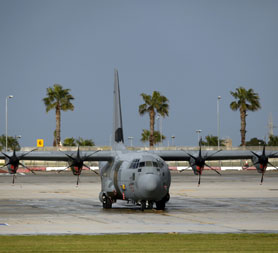Anti-Gaddafi gunmen accidentally fired on Hercules plane
As David Cameron announces that only a handful of Britons remain in chaos-stricken Libya, Channel 4 News understands that an SAS rescue plane was mistakenly fired upon by anti-Gaddafi gunmen.

British military planes entered Libyan air space on Sunday for a second time in as many days and rescued another 150 people from desert locations, officials said.
The C-130 Hercules planes, carrying Britons and other nationals who were mainly working as oil workers, safely landed at Malta International Airport, Luqa, on Sunday evening.
The Ministry of Defence (MoD) said the majority of those aboard the three RAF Hercules planes were British nationals.
The MoD earlier confirmed reports that during the operation to recover Britons, one of the aircraft suffered minor damage after being hit with small arms fire.
It later emerged that one bullet had penetrated the cabin and struck a soldier’s helmet, before ricocheting off without casuing any injury.
And Channel 4 News understands that the gunmen who fired on the Hercules’ were anti-Gaddafi and had fired upon the aircraft in a case of mistaken identity.
A spokesman for the Foreign office told Channel 4 News that it still does not know exactly how many Britons who wish to leave Libya remain in the country, and could not conclusivley say whether or not any nationals had been injured or killed there.
However, it is thought that the large majority of Britons have now been sucessfully evacuated.
Cameron tells Gaddafi ‘go now’
Meanwhile, David Cameron said that Britain should “look again at its entire relationship” with the Middle East following uprisings in the region.
Criticised last week for touring the Middle East with a group of arms manufacturers as Libya’s Muammar Gaddafi used British-made defence equipment against his own people, Mr Cameron said it was time to challenge the “outdated notion democracy has no place in the Arab world”.
In a statement to the Commons, he said it was not for Britain to “dictate how each country should meet the aspirations of its people” but the UK “must not remain silent in our belief that freedom and the rule of law are what best guarantee human progress and economic success”.
He said: “Freedom of expression, a free press, freedom of assembly, the right to demonstrate peacefully: these are basic rights. And they are as much the rights of people in Tahrir Square as Trafalgar Square.
Read more: analysis from Gary Gibbon
“They are not British or western values – but the values of human beings everywhere. So we need to take this opportunity to look again at our entire relationship with this region – at the billions of euros of EU funds, at our trade relationship, at our cultural ties.
“We need to be much clearer and tougher in linking our development assistance to real progress in promoting more open and plural societies.
“And we need to dispense once and for all with the outdated notion that democracy has no place in the Arab world.
“Too often in the past, we have made a false choice between so-called stability on the one hand and reform and openness on the other.
“As recent events have confirmed, denying people their basic rights does not preserve stability, rather the reverse.”
Mr Cameron added that the Middle East and North Africa was “now at the epicentre of momentous events”.
“History is sweeping through this region,” he said.
And he refused to rule out military action against Gaddafi, saying that the UK “must not tolerate this regime using military force against its own people”.
He said he had ordered the MoD to look at drawing up a military no-fly zone over Libya.
“It is clear that this is an illegitimate regime that has lost the consent of its people,” he said. “My message to Col Gaddafi is simple: go now.”
-
Latest news
-
As India goes to the polls in the world’s largest election – what do British-Indians think?6m

-
Tees Valley: Meet the candidates in one of the biggest contests coming up in May’s local elections4m

-
Keir Starmer says public sector reform will be a struggle7m

-
Nicola Sturgeon’s husband Peter Murrell charged with embezzlement of funds from SNP1m

-
Ukraine might finally get $60billion in American weapons and assistance to defend against Russia3m

-




